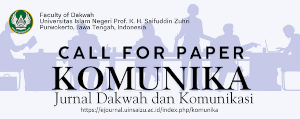KONSTRUKSI ISLAM DALAM KEKUASAAN NEGARA
DOI:
https://doi.org/10.24090/komunika.v6i2.359Keywords:
formalisasi, substansialisasi, kemaslahatan, politik Islam, konflik.Abstract
The relationship between Islam and state raises a controversy that includes two main groups;formalists and substantialists. Both of them intend to achieve a good social condition which is inaccordance with Islamic politics. The ideal form of good society to be achieved is principallydescribed in the main source of Islamic law, Al Qur’an and As Sunnah, as follows. A form of goodsociety should supprot equality and justice, egalitarianism, and democracy in its social community.The next problem is what the needed methods and instruments to achieve the ideal Islamic politicsare. In this case, the debate on the formalization and substance of Islamic teaching is related to therunning formal political institution.Each group claims itself to be the most representative to the ideal Islam that often leads to anescalating conflict. On the other hand thr arguments of both groups does not reach the wholeMuslims. As a result, the discourse of Islam and state seems to be elitist and political. As a result,Both groups suspect each other each other and try to utilize the controversy on the relationshipbetween Islam and state to get their own benefit which has no relation with the actualization ofIslamic teaching.Downloads
Download data is not yet available.
Downloads
Issue
Section
Articles
License
Authors who publish with this journal agree to the following terms:
- Authors retain copyright and grant the journal right of first publication with the work simultaneously licensed under a Creative Commons Attribution-ShareAlike 4.0 International License that allows others to share the work with an acknowledgement of the work's authorship and initial publication in this journal.
- Authors are able to enter into separate, additional contractual arrangements for the non-exclusive distribution of the journal's published version of the work (e.g., post it to an institutional repository or publish it in a book), with an acknowledgement of its initial publication in this journal.
- Authors are permitted and encouraged to post their work online (e.g., in institutional repositories or on their website) prior to and during the submission process, as it can lead to productive exchanges, as well as earlier and greater citation of published work (See The Effect of Open Access).




























